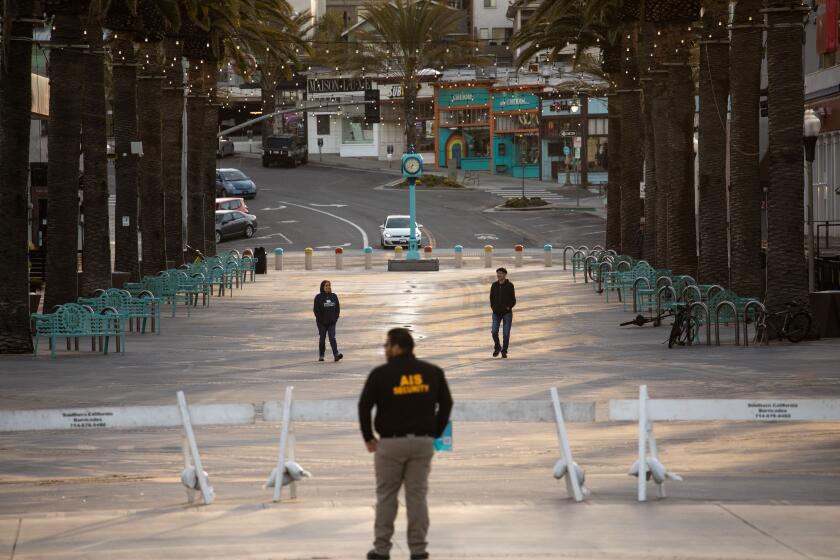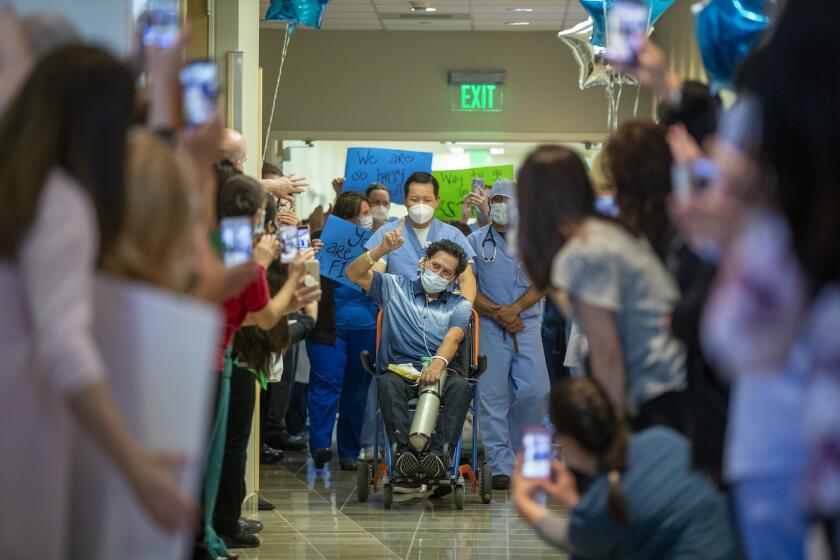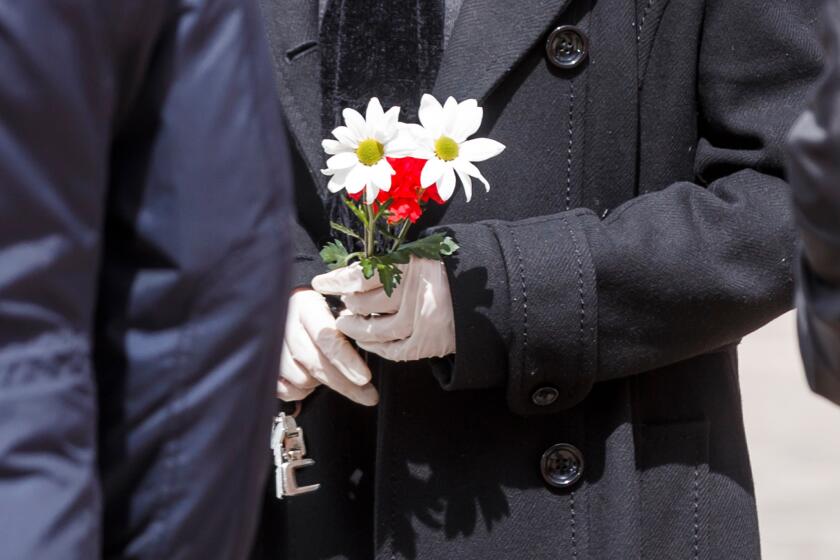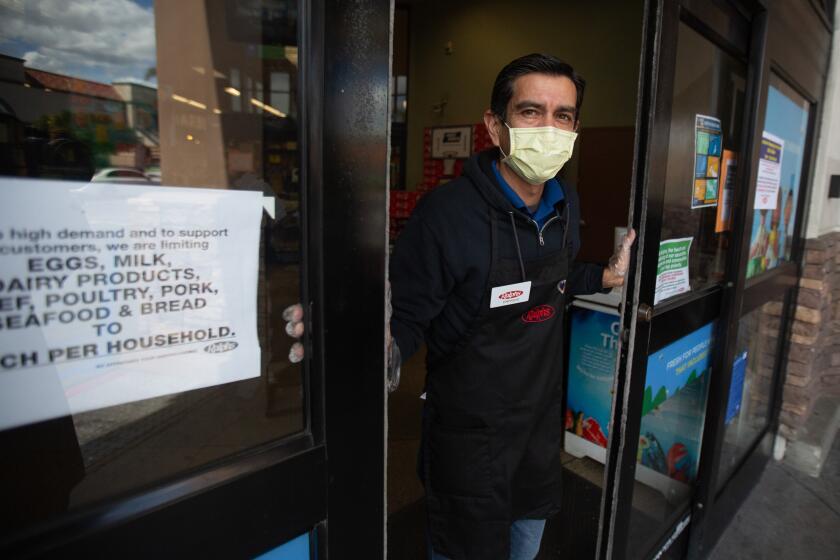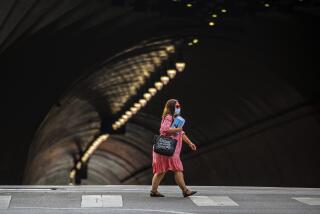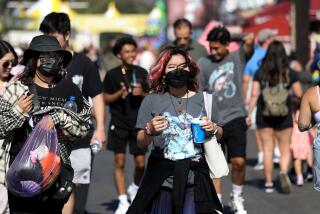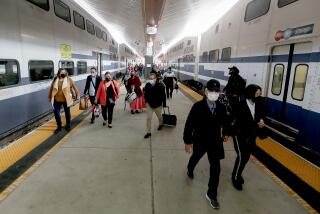L.A. County death toll nears 80 as number of coronavirus cases skyrockets past 4,000
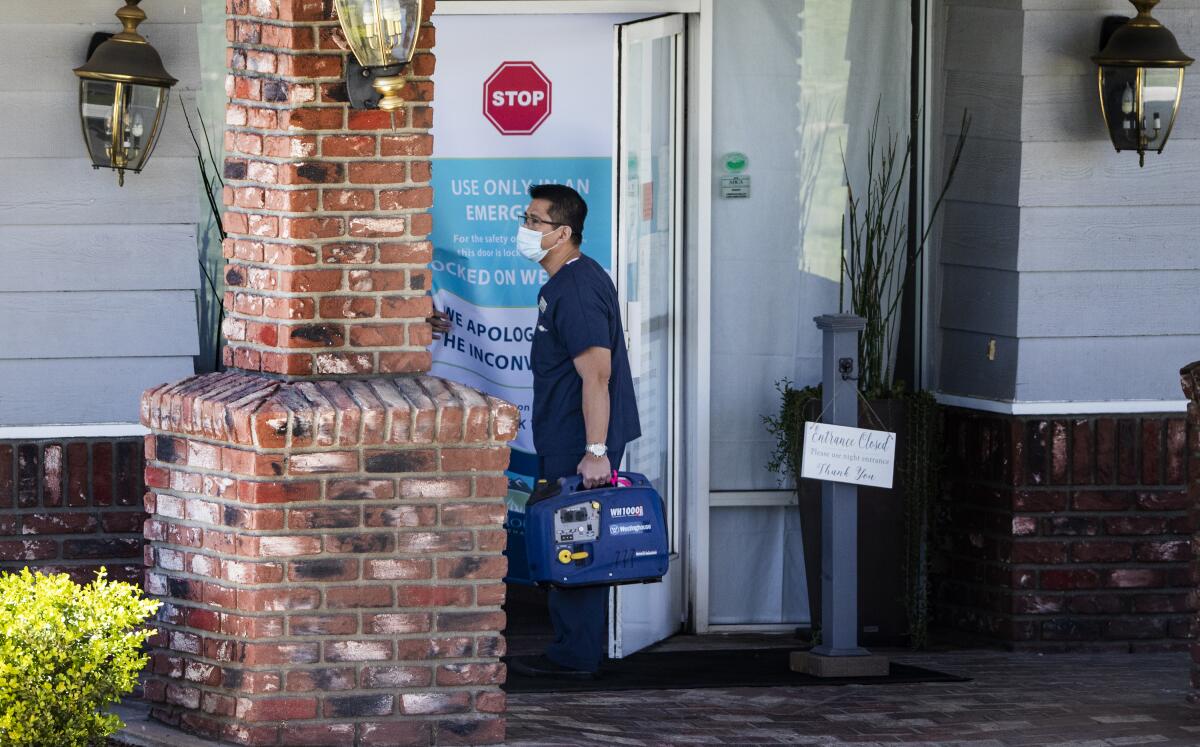
Los Angeles County health officials Thursday confirmed 13 new coronavirus-related deaths, bringing the toll to 78.
Twelve of the victims were over the age of 65 and of those, 11 had underlying health conditions, according to Barbara Ferrer, director of the Los Angeles County Department of Public Health.
The other person who died was between ages 41 and 65 and also had underlying health conditions, Ferrer said.
Los Angeles County officials also announced 534 new COVID-19 cases. Long Beach, which has its own health department, announced 14 new cases, bringing the city’s total to 153. There were 49 confirmed cases in Pasadena, which also has its own health department.
There were more than 4,000 confirmed cases overall in L.A. County as of Thursday afternoon. The daily count has increased by more than 1,000 in the last 48 hours.
“We are all in this together, so it makes sense that we work together to get through this,” Ferrer said. “Please don’t lose hope, and please don’t stop following all of the directives that you are following right now to slow the spread of COVID-19.”
As the COVID-19 pandemic continues its march across California, the number of cases in the state swelled to more than 11,000 Thursday — with the death toll topping 200. Of those cases, 40% have occurred in L.A. County.
Amid the surge, officials are continuing to urge the public to carry on with unprecedented social-distancing measures while also rushing to get more supplies to hospitals amid a rise in sick patients.
The rapid spread of the virus brought new concerns about whether the state’s healthcare system can handle the inflow of patients. Many California hospitals and local medical centers are grappling with shortages of supplies amid a scramble to prepare for what is expected to be a deluge of patients in the coming weeks.
The case count comes from a continuous Los Angeles Times survey of the dozens of local health agencies across California.
While the number of infections continues to swell statewide, Gov. Gavin Newsom said he believes the state’s social-distancing efforts have made a difference.
“The ICU numbers and the hospital numbers, while they’re growing, are not growing as significantly as you’re seeing in other parts of the country,” he said Thursday. “We’re not out of the woods by any stretch of the imagination.”
In recent weeks, a fierce debate has erupted between hospitals and nursing homes over the fate of elderly patients.
Hospitals are desperately trying to discharge patients to clear space for an expected wave of people infected with COVID-19. But nursing homes are reluctant to accept any new patients — or even returning residents — until it is proved that they are virus-free.
On Monday, the California Department of Public Health sided squarely with the hospitals, ordering skilled nursing facilities to accept residents even if they have tested positive for the novel coronavirus. After an outcry from elder advocates, one of whom called the directive “nothing less than a death sentence” for nursing home residents, state officials issued new guidance late Wednesday.
“The final determination lies with the local health department,” the state’s Department of Public Health said in an email to The Times. “Local public health officers have this authority in an emergency.”
Elder advocates, who say most nursing homes lack the equipment and training to properly quarantine patients with the virus, are not satisfied. Many want the state to set up entirely separate living spaces for nursing home residents with the virus, like empty hotels, dormitories or cruise ships.
“The state’s constantly shifting positions are confusing and will lead to bad outcomes,” said Michael Connors, a spokesman for California Advocates for Nursing Home Reform. “Which guidance are facilities expected to pay attention to?”
The confusing signals come as the number of suspected coronavirus infections at communal living institutions, including nursing homes, is skyrocketing. On Thursday, Ferrer announced her department was investigating potential outbreaks at 54 institutions, dozens more than the day before.
Eleven of the 78 people who have died of COVID-19 in Los Angeles County have been nursing home residents, officials said.
Los Angeles County public health officials continue to reiterate pleas for Angelenos to stay at home in an effort to stem the virus’ spread and give hospitals a chance to treat the ill without becoming overwhelmed.
Los Angeles Mayor Eric Garcetti went as far as advising the Department of Water and Power to shut off utilities to nonessential businesses violating the city’s order to close amid the pandemic.
“Slowing the spread of this virus and flattening the curve on new infections demands that we all do our part, and that’s the bottom line,” Garcetti said. “Yet still some nonessential businesses continue to operate, putting everybody at risk.”
Garcetti said Thursday night that eight businesses had been referred for criminal prosecution, but that the process will take time because courts are closed.
“We had a smoke shop that just refused to close,” Garcetti said. “And even when police officers were there, they said, ‘Forget you’ — probably not in as nice words — ‘we’re not going to do it.’”
The city is moving to shut off the smoke shop’s power, he said.
“We want to let people know that we are serious about this, that businesses that flagrantly violate this will be shut down short term and prosecuted in the medium term as well,” Garcetti said.
The virus could be carried to the ocean in runoff and then kicked into the air by the surf, a Scripps scientist says.
Orange County saw its biggest single-day increase in coronavirus infections Wednesday, as officials announced 107 new cases and three additional deaths. On Thursday, officials added 56 new cases to the list and three deaths, bringing the county’s death toll to 13.
Of the more than 7,790 people who have been tested countywide, 656 COVID-19 cases have been confirmed. More than 100 people are hospitalized, with 47 in intensive care units, according to county officials.
State officials announced Wednesday they will use the Fairview Developmental Center — a state-owned property in Costa Mesa — as an alternative care site to relieve stress on other regional hospitals. Repurposing the center, which long housed adults with developmental and behavioral disabilities, is part of an overall effort to boost the number of hospital beds available statewide.
The facility will provide up to 1,100 new hospital beds that should be available this month, according to Assemblywoman Cottie Petrie-Norris (D-Laguna Beach).
“Around the world and in other states, we have seen the horrific images and heard the heartbreaking stories of COVID-19 patients dying in hospital corridors because there are not enough beds,” she said in a statement. “We are aggressively preparing for California’s surge to try to avoid that nightmare.”
These are some of the unusual new scenes across the Southland during the coronavirus outbreak.
Santa Barbara County recorded its first death from the virus Wednesday. The person was in their 60s and had underlying health conditions, according to public health officials.
Twelve additional COVID-19 cases were confirmed throughout the county, bringing the number of confirmed infections to 111.
Meanwhile, Tehama County in Northern California announced its first case of the virus late Wednesday.
Riverside County Sheriff’s Deputy Terrell Young died from complications of the coronavirus, the department said Thursday. He had served in the department for 15 years and was its first member to succumb to the virus. He is survived by his wife of 31 years and four children.
In a news briefing Thursday, Riverside County Sheriff Chad Bianco described Young as a compassionate deputy who worked with the public and inmates.
“He was a fantastic role model for his kids, especially for his daughter,” Bianco said. “Employees knew they could count on him for good advice. Terrell was always on time and very well liked by his peers and supervisors and always willing to lend a hand. According to many, he was known for his smile and he will be deeply missed.”
Bianco said he believes Young contracted the virus after escorting an inmate to a Riverside University Health System hospital during the week of March 16. On March 22, Young went home from work after coming down with a fever. The next day, 10 employees, including Young, called in sick. The inmate Young had escorted also began experiencing symptoms that day. The inmate has tested positive for the virus, although it’s unclear if he tested positive before or after contact with Young.
Bianco said all employees and inmates who have exhibited symptoms have been quarantined and tested. So far, 25 employees and 11 inmates have tested positive for the virus, some of whom did not show any symptoms. Several employees have been or are in the hospital. One is in critical condition.
“It should be an eye-opener for the general public,” he said. “We are seeing the drastic and the viral aspects of this and it’s not pretty.”
The number of COVID-19 cases in Alameda County rose by 34 overnight, from 339 to 373. The number of deaths also rose from eight to nine, according to the Alameda County Public Health Department.
A person in neighboring San Joaquin County died from the virus Thursday, bringing the county’s death total to nine. The county also saw an increase of 12 cases, rising to 173, according to its Public Health Services department.
Health officials warned it could get much worse if Californians don’t adhere to the stay-at-home orders, which now could last well into May.
In our effort to cover this pandemic as thoroughly as possible, we’d like to hear from the loved ones of people who have died from the coronavirus.
Some officials have begun recommending that people wear face coverings when going out in public. However, Ferrer cautioned against using N95 and surgical masks, which are already in short supply for healthcare providers.
She said people could use a bandanna or piece of fabric to cover their nose and mouth while out in public doing essential errands, but she warned: “Wearing a mask is not a shield.” It does not replace frequent hand washing and social distancing efforts.
Ferrer said the face coverings were intended for interactions with other people.
If a person goes on a run alone, she said, a face covering is not necessary. If a person runs with other people, which should only be done if they are spread out, or stops to chat with someone while exercising, a covering is advised.
Garcetti said he had been awaiting advice on masks from the Centers for Disease Control and Prevention, but with the COVID-19 rate surging, he decided to wait no longer on weighing in on the mask debate.
Face masks could help against the coronavirus, but they aren’t an excuse for leaving your home for nonessential business, health officials say.
He said everyone performing essential tasks outside the home such as food shopping should wear homemade, nonmedical face coverings, or even bandannas, as people in other countries have done.
“Data shows many folks who are infected are aysmptomatic and can become super-spreaders, infecting people that they come into contact with,” Garcetti said Thursday evening.
“And together with physical distancing and staying at home, adding a protective face covering is another tool to slow the spread. We want you to keep your respiratory droplets to yourself.”
Times staff writers Joseph Serna, Kailyn Brown, Priscella Vega and Nicole Santa Cruz contributed to this report.
More to Read
Sign up for Essential California
The most important California stories and recommendations in your inbox every morning.
You may occasionally receive promotional content from the Los Angeles Times.
